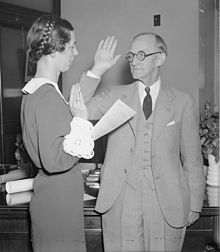Frank R. McNinch
| Frank R. McNinch | |
|---|---|

McNinch takes the oath of office, October 1, 1937, administered by Pansy Wiltshire; photo by Harris & Ewing
|
|
| Chairman of the Federal Communications Commission | |
|
In office October 1, 1937 – July 25, 1939 |
|
| President | Franklin D. Roosevelt |
| Preceded by | Anning S. Prall |
| Succeeded by | James Lawrence Fly |
| Chairman, Federal Power Commission | |
|
In office July 19, 1933 – September 30, 1937 |
|
| Preceded by | George Otis Smith |
| Succeeded by | Clyde L. Seavey |
| Mayor of Charlotte | |
|
In office 1917–1920 |
|
| Preceded by | Thomas Leroy Kirkpatrick |
| Succeeded by | John M. Wilson |
| Personal details | |
| Born |
Frank Ramsay McNinch April 27, 1873 Charlotte, North Carolina |
| Died | April 2, 1950 (aged 76) |
| Political party | Democratic |
Frank Ramsay McNinch (April 27, 1873 – April 2, 1950) was born in Charlotte, North Carolina. He was a political figure who served as the mayor of Charlotte, as chairman of the Federal Power Commission, and as chairman of the Federal Communications Commission. In the 1928 presidential election, McNinch, a Democrat, supported Republican Herbert Hoover for president. After he was elected, Hoover appointed McNinch to a seat on the Federal Power Commission, leading to a split in the North Carolina Democratic Party that damaged the political fortunes of new U.S. Sen. Cameron Morrison, a friend of McNinch. He was later appointed FPC chairman by Franklin D. Roosevelt.
The controversial 1938 Orson Welles War of the Worlds radio broadcast occurred during his tenure as FCC head. McNinch resigned as FCC chairman on July 25, 1939, due to ill health.
His home, the Frank Ramsay McNinch House, was listed on the National Register of Historic Places in 1999.
...
Wikipedia
